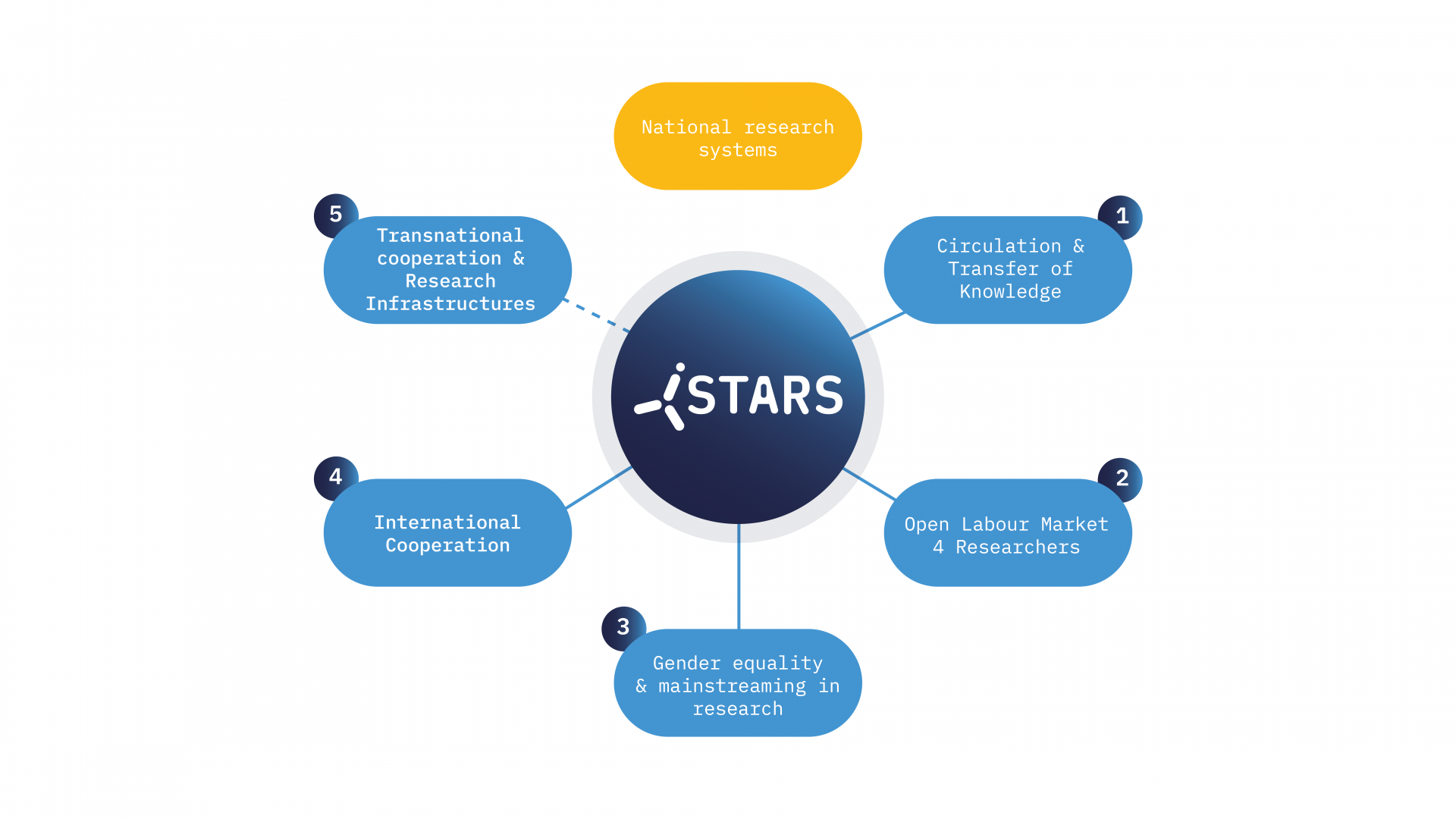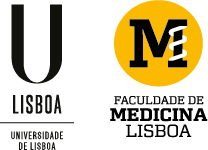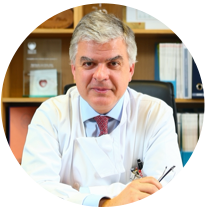Informatics and Statistical Tools for the Advancement of Research Success
ERA Chair iSTARS - Informatics and Statistical Tools for the Advancement of Research Success is a project of Lisbon School of Medicine (FMUL, Portugal) funded by the EU for a 6-year period. iSTARS will enact a true transformational change that will promote excellence in research and in acquisition of funding, by forming a new unit led by a researcher recruited for the ERA Chair position.
Highlights
João Carlos Guimarães, a newly arrived researcher at FMUL, was chosen to lead a research team under the ERA Chair iSTARS project! The purpose is to combine artificial intelligence and medicine to create databases with the capacity to store a large amount and a diversity of health-related information, as well as to develop machine learning models to identify patterns in these data. iSTARS research will seek answers in the fight and prevention of diseases, but also in the creation of new medical treatments. Read more »
ERA Chair initiative is both strategic and an effective key to release, capacitate and uplift the clinical/medical research potential through the virtuous cycle of better data science, more data use, better research questions, higher impact publications, and greater ability for winning competitive grants, leading to more resources and more value for medical studies at the Lisbon School of Medicine (FMUL).
iSTARS will establish a new unit on data science to nucleate FMUL’s vision in this area of having robust capabilities in:
- Data science, including biostatistics, data management, and data processing.
- Big data, including electronic health records, imaging, and novel research platforms.
- Artificial intelligence in medicine, here defined as natural language processing and (automated) machine learning.

Goals
The recruitment of ERA Chair and his/her team will be key in reorganizing and developing an effective strategy for capacity building in high quality data science for medical research, promoting excellent capabilities in informatics and data science for health research.
Increase the number of research applications to international calls coordinated by FMUL:
- by promoting cross-departmental collaborations,
- through the consolidation of methodological quality and analytical capability,
- by optimising the access and the use of preliminary data,
- by accelerating the research potential of biomedical and clinical researchers.
Contribute to a significant increase in the number of high-impact publications, by better integration of available data resources in high profile studies.
FMUL will have a high-level dynamic and sustainable data science, informatics and statistics unit, by the end of the project. This will be done by fostering better integration and use of data science resources across stakeholders, including researchers, pharmaceutical companies, scientific societies, patient associations, local and national government bodies to improve translational and outcomes research.
iSTARS will consolidate the capability to participate (e.g. by training) in large international projects, such as real-world research, translational research or clinical trial, or even by integrating pan-European Research Infrastructures such as ECRIN-ERIC.
Collaborate to implement the European Research Area (ERA) priorities, such as improvements in becoming “an open labour market for researchers”, and formal adoption of the European Charter of Researchers & Code of Conduct for the Recruitment of Researchers, with the objective of FMUL being recognized by EURAXESS “Human Resources Excellence in Research (HR4SR)” award.
Impact
The iSTARS project will help FMUL to be aligned with the 6 ERA priorities. (Check Era Priorites tab)
Measures of outcome: Increasing the number of papers published by FMUL researchers as “open access”. Achieving EURAXESS recognition with the "Human Resources Excellence in Research Award (HR4SR)".
iSTARS will contribute to this priority by providing the resources to recruit a top-level scientist as the ERA Chair, and his/her team of researchers, that will contribute for the excellence in research at FMUL and so becoming more attractive for international researchers.
Measures of outcome: Successful recruitment of ERA Chair and team. Achieving EURAXESS “Human Resources Excellence in Research Award (HR4SR)”.
The ERA Chair holder will have ample flexibility to create a work structure facilitating better informatics and statistical tools at the service of the scientific community of FMUL, promoting the consolidation of research excellence. In addition, iSTARS will support engagement with businesses through the Stakeholders Interest Group to define potential collaborations.
Measure of outcome: Increase the number of papers/year in leading journals. Forming an active Stakeholders Interest Group to promote joint research.
To improve the ability of FMUL researchers to compete for international funding, iSTARS led by ERA Chair holder will strength the capacities in project management, funding procurement and support in proposal preparation.
Measure of outcomes: Increase the number of applications to EU/international funded calls as project coordinator.
iSTARS will contribute to training in its scientific core skills, but also in important soft skills such as open science and gender mainstreaming.
iSTARS will also consolidate the position of FMUL in Translational and Clinical Research in support of TRIS-HCP.
The project will contribute to the “Creative media and cultural industry” by collaborating with artists in 3 designated projects: a workshop on data visualization and the commission of two art projects allusive to the theme of iSTARS.
Measure of outcome: Develop a plan to become an ERIC certified data centre and develop a strategic plan of participation in other European Research Infrastructure Consortia and pan-European research infrastructures.
To achieve iSTARS objectives with success, the work plan was divided into eight work packages that are logically connected, from project inception to project sustainability.
This WP will ensure the highest standards of project management for iSTARS, to successfully achieve the overall project objectives, and specific milestones and deliverables in a timely manner.
WP 2 will promote good practices in science communication to disseminate results of research, in direct collaboration with FMUL communication office. It will also include the management of all communication activities of iSTARS that aim to reach all stakeholders, including scientists, industry, government and citizens at large, with the right message and the right media.
WP 3 is fully devoted to the recruitment of a high-quality researcher to hold the position of ERA Chair ensuring that the person recruited is willing to engage with FMUL to help improving the excellence of research and impact FMUL’s research and innovation landscape.
WP 4 aims to implement the ERA vision and priorities, aligning FMUL’s strategies with those principles. This will include a diversity of actions, such as the implementation of the European Charter for Researchers and the Code of Conduct for the Recruitment of Researchers at FMUL; the inclusion of the gender dimension of medical research; and the advocacy for methodologies for “open data” research.
This WP will establish a sustainable critical mass for excellent medical informatics and data science at FMUL. This will improve studies design and data analysis, leading to higher impact research and higher probability of success in obtaining external funding. WP5 will also include the development of an advanced training program, including the involvement of international researchers, industry representatives, and participation in international meetings/courses.
This WP will design a strategy to boost researchers and research groups skills, to promote their collaboration and the application to competitive international funding. For this purpose, WP6 will entail a systematic map and analysis of the research capacity needs, resources and potential for research among FMUL researchers and other stakeholders, so that it is possible to tailor training, support and a service to raise research projects quality, relevance and innovation.
The WP 7 will develop a long-term plan for sustainability. The ERA Chair holder will coordinate an evaluation and analysis of medical informatics resources and needs focusing on FMUL and its network of stakeholder. The need and feasibility of a “Data Sciences Consultancy Service” at FMUL will also be analysed.
This WP will ensure that the research conducted by iSTARS research team complies with European Union requirements, maintaining the highest levels of ethical standards and best international practices, as is mandatory in the School of Medicine.
The European Commission has defined six key priorities that oriented the ERA vision in H2020: more effective national research systems; optimal transnational cooperation and competition & research infrastructures; open labour market for researchers; gender equality and gender mainstreaming in research; optimal circulation, access to and transfer of scientific knowledge; and international cooperation.
Although some of these priorities are outside the scope of action of FMUL such as “More effective national research systems” and “Optimal transnational cooperation and competition”, iSTARS will work to align research strategies with these priorities.

iSTARS will promote open access publication policies, and work with FMUL researchers to provide open access to their data within clinical and ethical constraints, in fulfilment of European Open Science Cloud (EOSC) strategy of “as open as possible, as closed as required”. In fact, Open Science and Open Data are key priorities of iSTARS.
iSTARS project will follow the European code of conduct for researchers - starting with a fully transparent, open and merit-based recruitment for the ERA Chair position and her/his team with international advertisement. Then, iSTARS will create excellent conditions for ERA Chair team to develop their scientific research: which include research support team, equipment and materials, and freedom to define research agenda. In parallel, iSTARS will design closely with FMUL a strategic plan to allow FMUL to be acknowledged with the“Human Resources Excellence in Research Award (HR4SR)”.
FMUL is fully committed to gender equality at all levels and in all its areas of action: management, education, research. To further this commitment, the iSTARS project team will help to conduct a gap analysis to identify gender bias in recruitment and promotion, an activity in support of obtaining the EURAXESS “Human Resources Excellence in Research Award (HR4SR)”. Gender mainstreaming in research involves the integration of a gender perspective into the preparation, design, implementation, monitoring and evaluation of research studies. This is particularly important in medicine, where clearly gender may play an important role in the outcome of research.
iSTARS will support “International Cooperation” in the area of medical informatics, both through our network of partners and new ones, which will be developed by the ERA Chair holder. Indeed, we will conduct an international search for this position, which is one of the goals identified for this priority.
iSTARS will use and contribute to the Portuguese Roadmap Infrastructures 2020. In particular, we plan a close association with the Translational and Clinical Research Infrastructure Specialisation Platform – Health Cluster Portugal (TRIS-HCP), which is an infrastructure that aims to bridge the gap between research carried out in laboratories and medical or clinical practice. FMUL is already part of TRIS-HCP (Translational and Clinical research Infrastructure Specialisation Platform – Health Cluster Portugal and iSTARS will take advantage of this.
Mission
Our team builds data science solutions to empower biomedical research and healthcare with data-driven insights and recommendations.
Research
Data science is a multi-disciplinary field integrating all data flow steps from collection to knowledge production. The large amount and diversity of health data being generated every day, such as patient records, wearables, or genomic profiles, combined with the versatility of artificial intelligence models to learn patterns from distinct data modalities provides a fertile environment for developing new computational capabilities in medical research and practice.
Our vision is that health data science will be foundational for a paradigm shift in healthcare from being disease treatment-oriented to focusing on preventive medicine and health promotion. Our team seeks to develop end-to-end data science frameworks comprising information management, data visualization, and production of new knowledge. We aim to contribute towards a healthcare system that is centered on the person or patient, thereby being more personalized, efficient and cost-effective.
Available soon
Project Coordination
Fausto J. Pinto
iSTARS Coordinator. Full Professor of Cardiology at FMUL. He was the FMUL dean from 2015 to 2022. Currently he is the coordinator of the Cardiovascular Centre of University of Lisbon. He is the Director both of Cardiology department at Santa Maria Hospital, and the Department of Heart and Vessels of the Lisbon North Hospital Centre. During his career, devoted to cardiology clinical practice, teaching and research, his work has been awarded by multiple scientific and clinical societies, both national and international.
Ana Abreu
iSTARS Co-coordinator. Assistant Professor of Cardiology at FMUL. Currently she is the director of Preventive Medicine and Public Health Institute, of the Environmental Health Institute Research Centre (ISAMB), and the Exercise and Cardiovascular Rehabilitation Lab, at FMUL. She also coordinates the Master program in Cardiovascular Rehabilitation and the Program of Cardiovascular Rehabilitation at FMUL/CHULN accredited by the European Society of Cardiology, in 2020. She is cardiologist in Santa Maria Hospital (from 2018), after worked for 30 years at Santa Marta Hospital.
Brígida Riso
iSTARS Project Manager. Invited Assistant Professor at FMUL. She holds a PhD in Sociology, and a Master Degree in Sociology of Health and Illness also by Iscte-IUL. Her research interests are biobanking, health data science, citizen participation in health research and research integrity. She is a certified trainer in Research Integrity (VIRT2UE) and Open Science (OpenAire).
Advisory Board
Luísa Loura
Associated Professor at Faculty of Sciences of University of Lisbon and researcher of the Centre of Statistics and Applications (CEAUL) also at University of Lisbon. She holds a PhD in Statistics and Computation. She is the former Director-general of statistics in the Ministry of Education (Portugal). Currently, she is the director of the PORDATA – a database devoted to the collection and organization of statistical data about Portugal, that are openly made available.
Ana Godinho
She holds a PhD in Neurobiology, but has been dedicated to science communication. She has >18 years of experience in science communication, including in Portugal, UK and Switzerland. She has developed science communication strategies for private research institutions (Gulbenkian Science Institute, Portugal), public universities (University of Edinburgh, UK), funding organizations (Portuguese Foundation for Science and Technology) and CERN, where she currently is the Head of Education, Communications and Outreach at CERN (Switzerland).
Marie Davidian
J. Stuart Hunter Distinguished Professor of Statistics at North Carolina State University (USA). Her work is in the areas of statistical methods for estimating optimal treatment regimens from data; methods for analysis of clinical trials and observational studies, including approaches for drawing causal inferences; statistical models and methods for analysis of longitudinal data; methods for handling missing and mismeasured data; and pharmacokinetic and pharmacodynamic analysis. She was president of the American Statistical Association in 2013, and is the winner of important prizes in statistics: the 2007 Janet L. Norwood Award for Outstanding Achievement by a Woman in the Statistical Sciences, the 2009 George W. Snedecor Award, the 2011 Florence Nightingale David Award.
Rodolphe Thiebaut
He is the Deputy Director of Bordeaux Population Health (France). He is head of “Statistics in Systems Biology and Translational Medicine”, and head methodological support for clinical research at the “Centre Hospitalier Universitaire” (Bordeaux, France). His main research is in statistical development and analyses of repeated data measurements, big data for translational medicine and modeling of infectious diseases. He is the Director of an innovative new graduate program in “Digital Public Health”.
Research team
João C. Guimarães
iSTARS ERA Chair holder. Invited Full Professor at the Faculty of Medicine of the University of Lisbon. He holds a PhD in Artificial Intelligence and a Bachelor's degree in Computer Science from University of Minho, Portugal. João conducts multi-disciplinary computational research in the biomedical and healthcare fields, combining data science, machine learning, computational biology, genomics and systems biology.
Researchers
In the near future ERA Chair holder will be responsible to recruit her/his research team to help in pursuing the iSTARS goals.
| Description | Public Dissemination | Due date – month |
|---|---|---|
| WP1 Project Management | ||
| D1.1 Introduce previous publications in the “Continuous Reporting Tool” | Yes | M2 |
| D1.2 First version data management plan | No | M6 |
| D1.3 Manual of management standard operating procedures | No | M18 |
| WP2 Communication and Dissemination of Outcomes | ||
| D2.1 Launching the project website | Yes | M8 |
| D2.2 Branding strategy and updated communication plan document | No | M18 |
| D2.3 Organize a symposium on data visualization | Yes | M45 |
| D2.4 Commission of an art work (I) | Yes | M21 |
| D2.5 Commission of an art work (II) | Yes | M45 |
| WP3 Recruit ERA Chair | ||
| D3.1 Presentation of a report on ERA Chair recruitment process | No | M9 |
| WP4 Implement ERA vision and priorities | ||
| D4.1 International event on gender mainstreaming in medical research | Yes | M27 |
| D4.2 Gap analysis and draft action plan for implementation of HRS4R | No | M30 |
| D4.3 Interim Assessment | No | M54 |
| D4.4 Document FMUL strategy regarding ERA priorities | No | M45 |
| D4.5 Define policies for “open data” | No | M45 |
| WP5 Resource development and capacity building | ||
| D5.1 Develop a professional training plan for support staff | No | M18 |
| D5.2 International meeting to disseminate outcomes (I) | Yes | M32 |
| D5.3 International meeting to disseminate outcomes (II) | Yes | M56 |
| WP6 Map and Identify Research Groups’ Capacity Needs, Research Resources, Agendas and Potential | ||
| D6.1 Strategic plan for FMUL participation in pan-European research infrastructures | No | M60 |
| WP7 Define data service needs and develop a sustainability plan | ||
| D7.1 Sustainability plan for iSTARS impact at FMUL | No | M72 |
| WP8 Ethics requirements | ||
| D8.1 H - Requirement No. 2 | No | M8 |
| D8.2 H - Requirement No. 3 | No | M8 |
| D8.3 POPD - Requirement No. 6 | No | M8 |
| D8.4 POPD - Requirement No. 7 | No | M8 |
| D8.5 POPD - Requirement No. 8 | No | M8 |
| D8.6 POPD - Requirement No. 9 | No | M8 |
| D8.7 POPD - POPD – Requirement No. 10 | No | M8 |
| D8.8 GEN - Requirement No. 14 | No | M8 |
| D8.9 GEN - Requirement No. 15 | No | M6 |
- Canto E Castro, L., Pereira, A., Ribeiro, R., Alves, C., Veloso, L., Vicente, V., Alves, D., Domingues, I., Silva, C., Gomes, A., Serrano, M., Afonso, Â., Veldhoen, M., de Sousa, M., de Sousa, J., de Sousa, G., Mota, M. M., Silva-Santos, B., & Ribeiro, R. M. (2021). Prevalence of SARS-CoV-2 Antibodies after First 6 Months of COVID-19 Pandemic, Portugal. Emerging Infectious Diseases, 27(11), 2878–2881. https://doi.org/10.3201/eid2711.210636
- Santos, C. D., Santos, A. F., das Neves, R. C., Ribeiro, R. M., Rodrigues, F., Caneiras, C., Spruit, M. A., & Bárbara, C. (2021). Telemonitoring of daily activities compared to the six-minute walk test further completes the puzzle of oximetry-guided interventions. Scientific Reports, 11(1), 16600. https://doi.org/10.1038/s41598-021-96060-w
- Kamel Boulos M.N., Kwan, M.P., El Emam, K., Chung, A.L., Gao S., Richardson, D.B. (2022). Reconciling public health common good and individual privacy: new methods and issues in geoprivacy. International Journal Health Geographics. 21(1):1. https://doi.org/10.1186/s12942022003009
- Koh, K., Hyder, A, Karale,Y., Boulos, M.N.K. (2022). Big Geospatial Data or Geospatial Big Data? A Systematic Narrative Review on the Use of Spatial Data Infrastructures for Big Geospatial Sensing Data in Public Health", Remote Sensing, 14 (13): 2996. https://doi.org/10.3390/rs14132996
- Canto E Castro, L., Gomes, A., Serrano, M., Pereira, A., Ribeiro, R., Napoleão, P., Domingues, I., Silva, C., Fanczal, J., Afonso, Â., Lopes, A., Toader, I., de Sousa, M., de Sousa, J., de Sousa, G., Mota, M. M., Silva-Santos, B., Veldhoen, M., & Ribeiro, R. M. (2022). Longitudinal SARS-CoV-2 seroprevalence in Portugal and antibody maintenance 12 months after infection. European Journal of Immunology, 52(1), 149–160. https://doi.org/10.1002/eji.202149619
- Malato, J., Ribeiro, R.M., Pinto Leite, P., Casaca, P., Fernandes, E., Antunes, C., Fonseca, V.R., Carmo Gomes, M., Graça, L. (2022). Risk of BA.5 infection in individuals exposed to prior SARS-CoV-2 variants, New England Journal of Medicine. 387:953-954. https://doi.org/10.1056/NEJMc2209479
Resources
We don't have any open opportunities at the moment.
Gender Mainstreaming in Medical research
![]()
Edifício Egas Moniz - Piso 0
Project Manager
Brígida Riso
Last update: January 2023


















